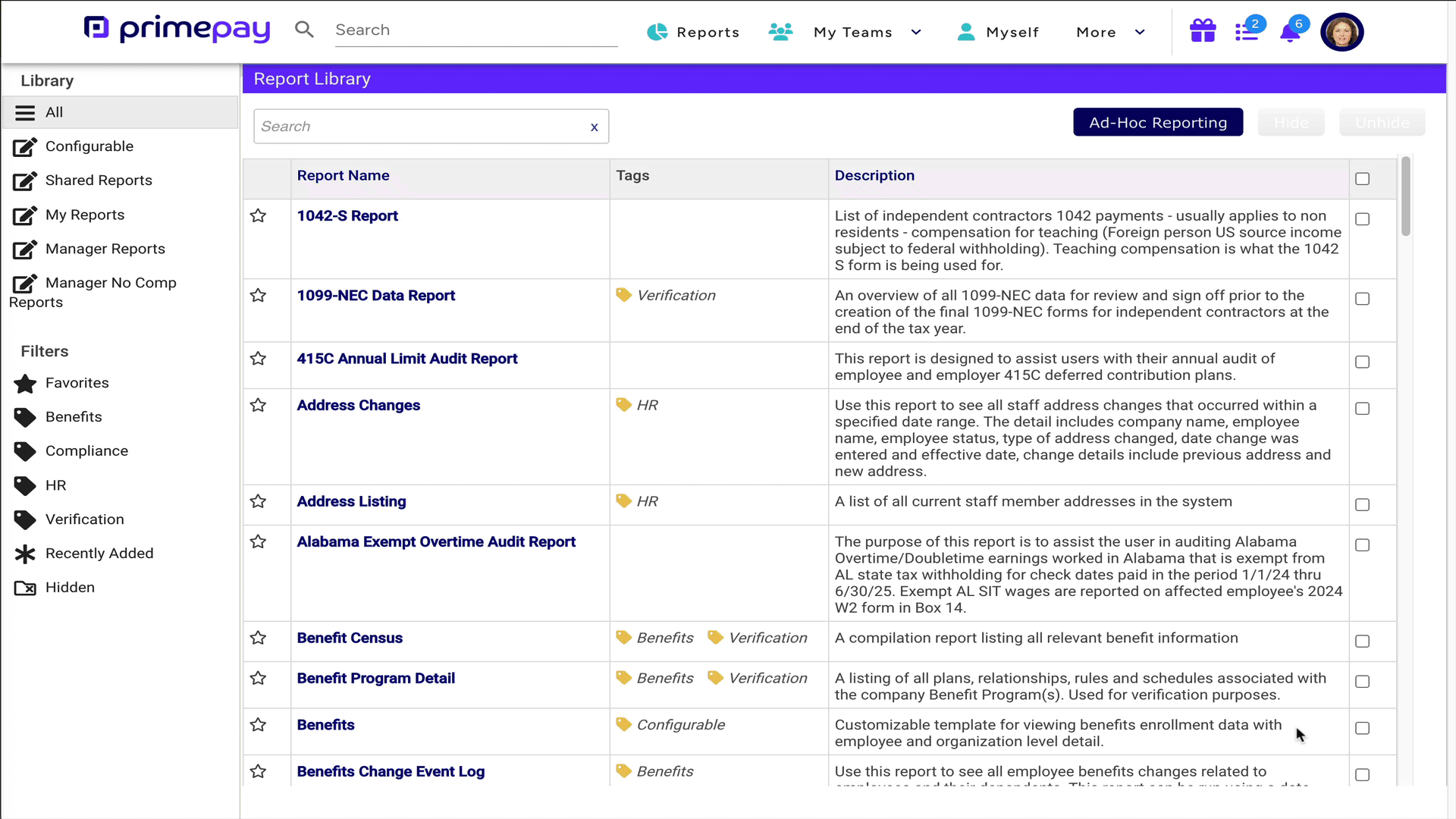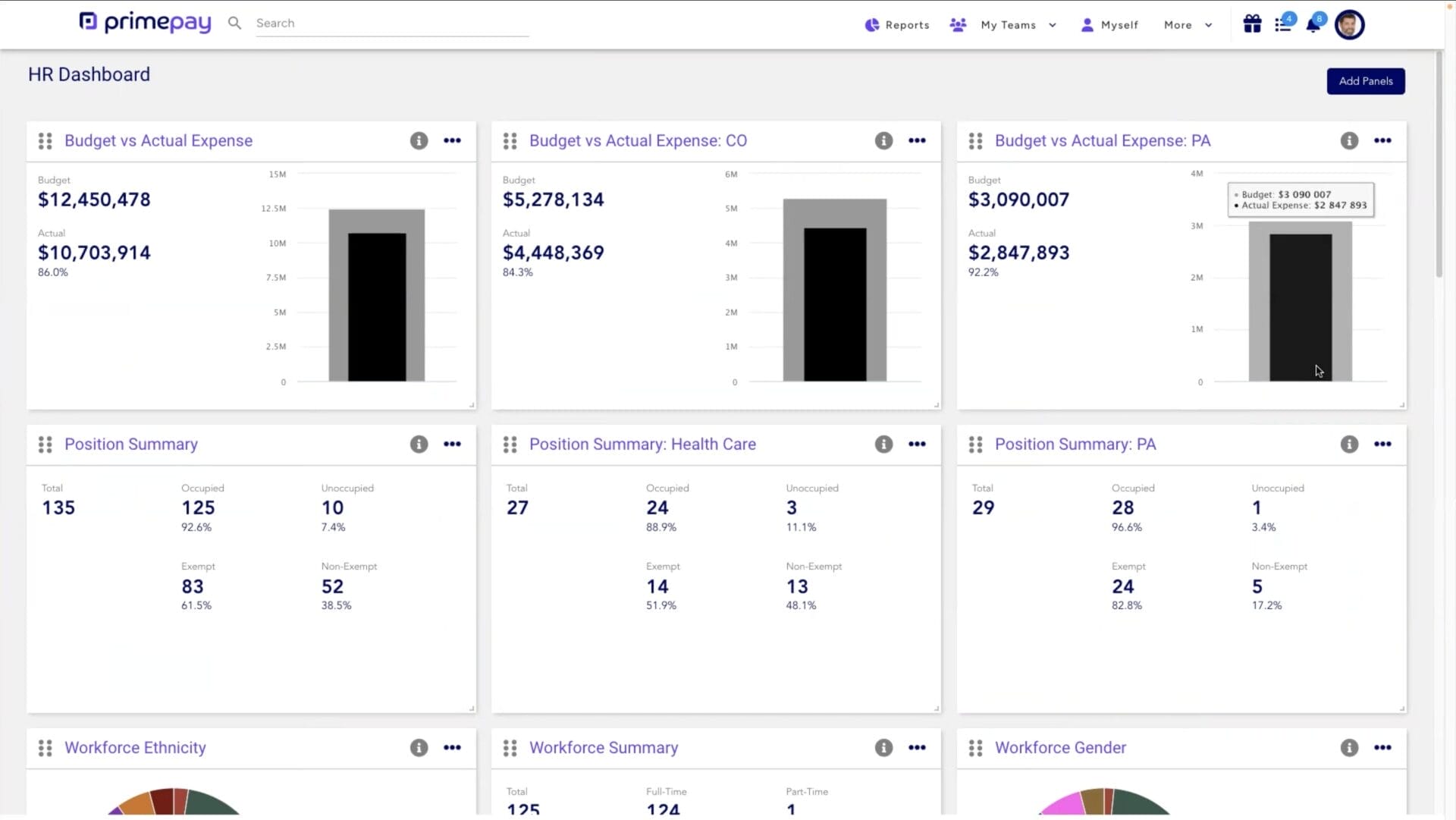Eighty percent of organizations have a human resource (HR) system in place, which is great. But, 36% of HR leaders say their technology isn’t adequate.
Where’s the disconnect?
While we don’t have a crystal ball, it’s safe to say that many organizations invest in HR systems to solve current problems instead of ones that scale with their company.
So whether you’re shopping for a new solution or are new to HR technology, it’s important to understand the benefits of HR software and its key features. With this information, you can better select the right system for your organization (now and in the future), maximize your ROI, and equip your HR team with the tools needed to succeed.
What is HR Software?
HR software is a digital solution that centralizes employee data, automates processes, and streamlines day-to-day HR tasks. This powerful tool serves as a hub and handles various HR processes (from recruitment to retirement) to help facilitate efficient HR management.
Cloud-based HR software solutions are gaining popularity for companies of all sizes due to their flexibility, scalability, and proclivity to a remote work culture. In fact, 98% of businesses in the market for new HR management software want a cloud-based platform to allow people to access information anytime, anywhere.
There are various types of HR software, each equipped with a unique set of features tailored to cater to specific HR functions. For instance, HR and payroll software are focused on managing employee compensation, while Human Resources Information Systems (HRIS) handle broader HR tasks such as benefits administration and employee data management.
Which HR management software solution is right for you? The answer hinges on your organization’s specific needs, goals, and budget.
A small business may require a simple HR management system, while a large corporation might benefit from an integrated Human Capital Management (HCM) platform that supports complex HR functions. Your best bet is to invest in software with bundled solutions so you can add and subtract functionalities as your organization grows.
The Benefits of HR Software
Regardless of the size of your business, implementing human resources management systems as your HR software solution can revolutionize your HR department. Teams of all sizes experience benefits from implementing HR software, such as increased efficiency, higher employee engagement, adherence to compliance, and increased insights.
Saving Time and Money
Consider why people choose a role in HR. It probably isn’t because they love managing employee records or double-checking data entries. Unfortunately, that’s the reality of many companies, since long to-do lists and limited headcounts mean HR professionals are spread thin across administrative tasks.
By automating manual tasks via HR software – such as attendance tracking, running payroll, and administering benefits – HR teams can instead focus on strategic initiatives and passion projects that help improve the employee lifecycle and increase organizational success.
Increasing Reporting Capabilities
HR software also can generate comprehensive reports and analyze data. With these analytics, HR leaders can spot trends and opportunities to act upon.
Jamie Press, PrimePay’s SVP of Human Resources, believes using PrimePay’s HR features has transformed her team’s policies and practices. She explains: “The HR dashboard has become our go-to tool, providing valuable insights into turnover patterns and pay equity issues. Using reports leads to informed decision-making, like when we had to adjust compensation packages for our sales team based on data insights.”

With the right HR software, you can slice and dice your data for deeper insights into your processes and people.
Boosting Employee Engagement
Most HR tools include an easily accessible employee self-service portal (say that three times fast). With it, employees can easily access their personal information, apply for leave, and monitor their employee performance, helping foster a sense of ownership and engagement.
Because their information is in one place, employees rarely need guidance on “what lives where” from HR teams and can instead make informed decisions about their compensation, benefits, and PTO.

Self-service functionality enhances employee convenience and engagement and alleviates back-and-forth communication with HR teams.
Ensuring Compliance and Security
No organization sets out to break the law, but unfortunately, those who still manually input data put themselves at risk. Because there’s a 40% probability that human error will occur when entering data, leading to potential penalties and costly consequences.
HR software automates payroll, taxes, and HR compliance, ensuring businesses operating in regulated industries comply with labor laws and regulations. Because HR systems stay updated with the latest regulatory changes, organizations avoid penalties and maintain a positive reputation.
Additionally, HR software solutions are equipped with robust security features – such as solid user authentication practices, encryption of sensitive data, and continuous monitoring capabilities – so employee data is always protected.
Top HR Software Features
Supporting various HR functions is one of the key features of HR software. While it’s not a one-size-fits-all platform, a comprehensive HR system should include modules for:
- Employee Information Management: HR software provides a centralized database for storing and managing employee information. It eliminates the need for manual record-keeping, making it easier to access and update employee data whenever necessary and maintaining the accuracy of employee information.
- Time and Attendance Tracking: With HR systems, tracking employee attendance and managing leave becomes effortless. It allows employees to log their working hours and request time off, and enables supervisors to approve or reject such requests seamlessly.
- Payroll Processing: HR software automates the payroll process, reducing the chances of errors and ensuring accurate and timely salary payments. A robust payroll software solution can calculates taxes, deductions, and benefits, saving HR professionals valuable time and effort.
- Recruitment and Onboarding: HR software simplifies recruitment by creating job postings, managing applications, and conducting candidate screenings. It also facilitates onboarding to provide a smooth transition for new hires.
- Performance Management: HR software can efficiently conduct performance evaluations and goal setting. It allows managers to track employee performance, provide feedback, and set objectives, contributing to a more transparent and efficient performance management system.
- Training and Development: HR tools can help create and manage employee training programs, track progress, and provide learning resources. It promotes continuous learning and development within the organization.
- Compliance and Reporting: HR software ensures compliance with labor laws and regulations by generating reports and maintaining accurate records. It simplifies managing employee benefits, tax forms, and other legal requirements.
Choosing an HR System That Fits
In five years, will your organization’s KPIs be the same as they are today? Hopefully not. Because you expect your organization to transform, it makes sense that your technology needs will also shift.
That’s why, in your list of necessary HR software features, you should also have “flexibility to adapt to organizational changes.” Whether it’s a merger, acquisition, or a shift in how your people work, the right HR software can support seamless transitions and ensure continuity in HR functions. HR software like PrimePay allows your organization to scale and shift when you need it to, so your systems always fit with your current size and needs.
No matter your headcount, consider your needs, goals, and budget to determine which HR tool will provide a comprehensive view of your current and future organizational data.
Invest in HR Software for Efficiency and Effectiveness
HR software is an indispensable tool for any organization seeking to improve the efficiency and effectiveness of its HR functions. Ultimately, HR software can significantly enhance your organization’s HR operations by streamlining processes, enhancing employee engagement, ensuring compliance, and protecting data.





